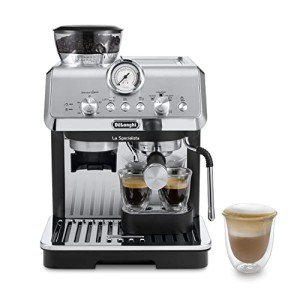Energy-Efficient Espresso Machines's History History Of Energy-Efficient Espresso Machines
Energy-Efficient Espresso Machines: A Comprehensive Guide
In the world of coffee lovers, espresso machines are typically considered as essential devices for developing abundant, aromatic coffee. However, the energy usage related to these machines can lead to increased energy expenses and ecological issues. As customers end up being more eco-conscious, energy-efficient espresso machines have emerged as a popular option. This article aims to check out the features, benefits, and choices available in energy-efficient espresso machines, assisting coffee enthusiasts make notified choices.
What Makes an Espresso Machine Energy-Efficient?
Energy-efficient espresso machines are designed to reduce energy intake while preserving ideal efficiency. Numerous functions add to the energy effectiveness of these machines:
Insulation: High-quality insulation helps maintain heat, minimizing the energy required to keep optimal brewing temperatures.
Smart Technology: Many modern machines are geared up with programmable settings that permit users to set up developing times and change to standby mode when not in use.
Quick Heat-up Time: Energy-efficient espresso machines typically use innovative heating innovations, such as thermoblocks or PID controllers, to heat water quickly.
Low Wattage: Machines that operate at lower wattages consume less energy in general, making them more effective.
Automobile Shut-off: Automatic shut-off includes guarantee that the machine shuts off after a particular duration of inactivity, further decreasing energy waste.
Benefits of Energy-Efficient Espresso Machines
Buying an energy-efficient espresso machine can use a number of benefits:
Cost Savings: Over time, lower energy usage can result in decreased electrical power costs.
Ecological Impact: Using less energy lowers carbon footprints, making these machines a more sustainable choice for ecologically mindful customers.
Enhanced Performance: Many energy-efficient models also provide superior developing technologies, leading to better-tasting espresso.
Durability: Typically, energy-efficient machines are built with high-quality elements, leading to higher durability.
Functions to Consider
When picking an energy-efficient espresso machine, several features should be taken into consideration:
- Type of Machine: Options include manual, semi-automatic, and completely automatic models, each with differing degrees of user control and automation.
- Brew Quality: Look for machines that utilize high-quality brewing systems to ensure ideal taste extraction.
- Upkeep: Some machines have self-cleaning features that can save energy and effort in maintenance.
- Capability: Depending on personal or family size, machine capability can impact energy usage, with larger machines often needing more power.
Popular Energy-Efficient Espresso Machines
The marketplace provides a range of energy-efficient espresso machines dealing with various requirements and choices. Below are some noteworthy models:
Brand
Design
Secret Features
Energy Consumption
Breville
Barista Express
Integrated grinder, PID temperature control, quick heat-up.
Low
DeLonghi
EC155
Compact size, easy to use, durable construct.
Moderate
Rancilio
Silvia
Sturdy design, outstanding temperature stability, and has a low ecological impact.
Moderate
Gaggia
Traditional
Reputable manual operation, long lasting brass parts, and efficient steaming capability.
Low
Jura
E8
Fully automatic, clever features, and a removable brew group for easy cleaning.
Low
Tips for Optimal Energy Efficiency
Aside from picking an energy-efficient model, customers can adopt several practices to make the most of energy effectiveness:
- Preheat: If your machine has a preheating function, use it to make sure that the ideal temperature level is reached rapidly before brewing.
- Switch off After Use: Always turn off the machine after developing or utilize machines with automobile shut-off features.
- Routine Maintenance: Keep the machine properly maintained to guarantee it operates effectively and successfully.
Frequently Asked Questions About Energy-Efficient Espresso Machines
1. Are energy-efficient espresso machines more costly?
While the initial investment may be higher for energy-efficient models, the long-term savings on electricity bills can balance out the preliminary expense. In addition, numerous energy-efficient machines included sophisticated functions that boost the brewing experience.
2. How do I understand if an espresso machine is energy-efficient?
Look for indications such as Energy Star certification, user reviews, and specs concerning wattage and heat-up time. Stainless Steel Espresso Machines with specific functions aimed at reducing energy usage are generally developed for better effectiveness.
3. Can I use an energy-efficient espresso machine for other coffee styles?
Numerous energy-efficient espresso machines provide versatility, enabling users to brew various coffee designs beyond espresso, such as lattes and coffees, by integrating steaming abilities.
4. Do energy-efficient designs sacrifice quality for effectiveness?
Not necessarily. Lots of energy-efficient espresso machines are geared up with high-quality developing innovation that can enhance flavor extraction while decreasing energy intake.
5. What upkeep is required for energy-efficient espresso machines?
Regular maintenance includes cleaning up the machine, descaling when required, and regularly examining seals and gaskets to make sure ideal efficiency and energy performance.
Energy-efficient espresso machines represent a best mix of efficiency, cost savings, and ecological duty. By thinking about numerous features, advantages, and brands, consumers can choose a model that fits their special choices while contributing favorably to the environment. As the trend towards sustainable living grows, the popularity of energy-efficient devices, consisting of espresso machines, is likely to continue its upward trajectory, providing coffee fans a guilt-free method to enjoy their day-to-day dose of espresso.
